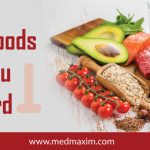Cholesterol is a fatty substance that is produced by the liver and released in the bloodstream. It is composed of three main types that are – LDL (Low-density lipoprotein) cholesterol, also called “bad” cholesterol, HDL (High-density lipoprotein) cholesterol or “good” cholesterol, and triglycerides. The reason why LDL is called bad is that it can lead to heart damage, stroke, and other health complications related to the blood vessels.
HDL
HDL or good cholesterol is called so because it helps reduce the levels of LDL along with other forms of cholesterol in the body. It takes the LDL to the liver again, to get it flushed out from the body. Moreover, HDL is an essential cholesterol that helps in carrying out metabolic processes.
The liver is the organ, which is responsible for reducing cholesterol, apart from that, cholesterol can also get introduced to your body through foods. In this blog, we shall see what kinds of foods can increase your cholesterol levels.
Dangers of high cholesterol levels
- Heart disease
- Heart attack
- Stroke
- Atherosclerosis (narrowing and hardening of blood vessels)
- Vascular disorders
Foods that lead to high cholesterol
Fried foods
Foods that are prepared by deep-frying contain high amounts of saturated fats and cholesterol. It can increase the levels of LDL or bad cholesterol in the body. The saturated fat in fried foods is utilized by your body for producing cholesterol. Such foods increase the levels of LDL cholesterol in your body which can accumulate in the blood vessels, and in turn increase your risk of developing heart disease, atherosclerosis, vascular disorders, heart attack, or stroke. Therefore, you must avoid deep-fried meals and switch to less oily meals or foods that are prepared with a zero-oil cooking process.
Processed foods
Processed meat – It is better to consume fresh meat rather than consuming processed meat. It is the biggest contributor to high cholesterol. It raises the levels of LDL cholesterol which leads to the buildup of plaque in the vascular passages. This plaque formation restricts the flow of blood in the arteries, which is why the heart has to pump with a greater force, which can lead to heart damage.
Ready-to-eat or takeaway food – Such foods are loaded with sugars, refined oil, refined flour, saturated fats, etc. which causes a rise in the levels of LDL cholesterol, thereby increasing your risk of developing heart damage or stroke.
Baked foods that are store-bought
Such foods are usually loaded with large amounts of butter, which can increase the levels of LDL and other forms of cholesterol in the body. Examples of baked goods are cakes, pastries, cookies, etc. Excessive LDL will clog the arterial passages and hinder the flow of blood through the arteries.
Such foods also contain high amounts of sugar, refined carbohydrates, and a lot of sodium, which are unhealthy ingredients. Consuming such foods can contribute to health damage, so individuals diagnosed with high cholesterol must avoid their intake.
Fast food
While running late you may grab some fast food to drive away hunger pangs. Such foods might fill you up, but you won’t get any benefits out of them. Such foods lack nutritional value and are not prepared in hygienic conditions most of the time. On top of that, such foods contain a high quantity of saturated fats, which increases LDL levels in your blood.
The levels of HDL drops, which can lead to heart-related ailments, so, you should pick your meals wisely. Rather than eating outside, prefer home-cooked meals that are cooked under hygienic conditions using healthy ingredients, zero to low oil, and.
Butter
Butter is rich in saturated fats, which can raise your cholesterol levels. The liver metabolizes saturated fats and produces cholesterol out of it and releases it in the bloodstream. You can switch your regular butter to unsaturated fat butter. Butter containing polyunsaturated or mono-unsaturated fats is a healthier option.
Whole-fat dairy products
High-fat dairy foods such as whole milk, whole milk yogurt, heavy cream, butter, full-fat cheese, whole milk, and cottage cheese are rich sources of essential nutrients, but they are also responsible for raising your cholesterol levels. Dairy products are ladened with high amounts of saturated fats, which can lead to plaque accumulation in the arteries.
High levels of LDL increase health complications like heart attacks and strokes. These foods potentially increase the bad cholesterol in your body, so it is necessary to avoid them or limit their consumption, which will help you in eliminating the risk of health issues.
Alternative Options
You can switch to healthy alternatives such as skimmed milk instead of whole milk, low-fat cottage cheese instead of whole-fat cheese, and so on. Moreover, These alternative options can get your essential minerals and vitamins without the rise in LDL cholesterol in the body.
Some foods such as eggs, shellfish, and dairy products are sources of high cholesterol, but they are also excellent sources of essential nutrients. Although they have high amounts of cholesterol, they do not contain saturated fats, therefore, individuals with a risk of high cholesterol can consume these foods but in moderation. These foods are considered safe, as the body uses only saturated fats and trans fat from the foods to produce cholesterol. Having them in moderation can provide you with vitamins and minerals.
Foods to reduce cholesterol
- Leafy vegetables such as spinach, collards greens
- Nuts such as walnuts, pecans, almonds, cashews, pistachios
- Vegetable oils such as sunflower oil, canola oil, olive oil
- Whole grains such as millet, barley, whole wheat, brown rice, oats
- Fruits like strawberries, apples, citrus fruits, etc.
- Beans


